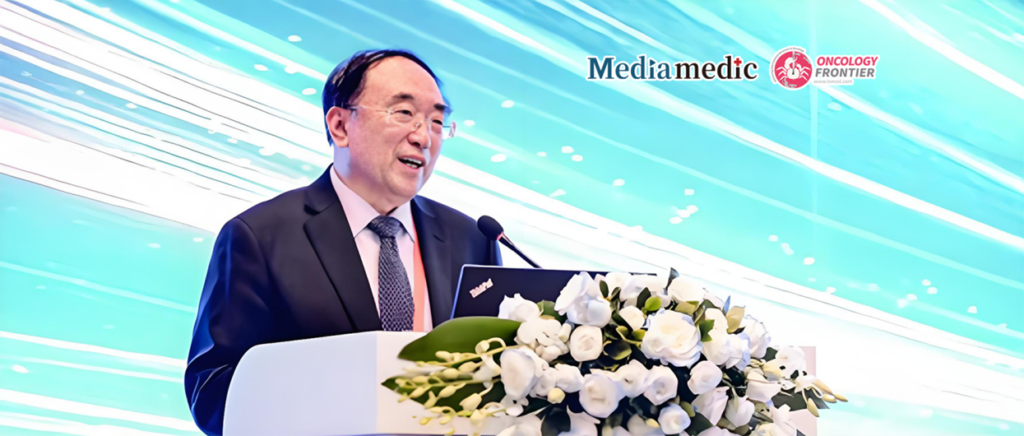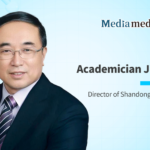
At the 2025 China National Breast Cancer Conference, CSCO President and Director of Shandong Cancer Hospital, Academician Jinming Yu, delivered a keynote address titled “Precision Integration of Radiotherapy and Immunotherapy in Breast Cancer.” His presentation explored not only the evolving role of radiotherapy in breast cancer treatment but also offered key insights into strengthening China’s scientific innovation capacity in oncology. Following the session, Oncology Frontier invited Academician Yu to share his perspectives on the clinical application of radiotherapy in breast cancer, strategies for advancing China's global competitiveness in oncology, and his long-standing commitment to cultivating young academic talent.Oncology Frontier: CSCO BC has become one of the most authoritative platforms in breast cancer. How do you view this year’s National Breast Cancer Conference? And what is your vision for the future development of CSCO BC?
Academician Jinming Yu: The National Breast Cancer Conference is one of the largest and most influential meetings in this field. It brings together clinical practice, basic research, pharmaceutical innovation, and policy discussion—all of which make it a highly welcomed and valuable event. Even with limitations on attendee numbers, the conference still attracted a strong roster of top-tier experts and active participants.
In the future, I hope that not only the CSCO Breast Cancer Expert Committee but also other committees—such as those focused on lung, gastric, and colorectal cancer—can continue to offer both high-level academic programs and more accessible, diverse educational content. We need both the “academic banquet” and the “academic buffet” to inspire deeper thinking and raise the overall level of oncology research in China.
Oncology Frontier: In your keynote speech, you emphasized the concept of “precision integration” between radiotherapy and immunotherapy in breast cancer. What are the biological foundations and clinical benefits of this strategy? And which patient populations might benefit most?
Academician Jinming Yu: While the combination of radiotherapy and immunotherapy has matured in the treatment of non-small cell lung cancer, it remains underutilized in breast cancer. Some have questioned whether radiotherapy is losing its role in this setting. I believe that’s a misunderstanding. On the contrary, with the growing role of systemic therapies—including targeted agents, immunotherapy, and chemotherapy—radiotherapy has become even more important, especially in early-stage breast cancer.
In recent years, both surgical and radiation approaches have moved from “more to less”—in other words, toward more targeted and refined interventions. This is not a sign of decline but of scientific progress. When radiotherapy is integrated with other treatments, it can yield superior results. For example, in colorectal cancer, radiotherapy alone has allowed some patients to avoid chemotherapy or even surgery.
Emerging technologies are also expanding the value of radiotherapy. Proton therapy, for instance, offers a new option for patients after breast-conserving surgery. For patients with left-sided breast cancer or those requiring irradiation of the chest wall and lymph nodes, proton therapy has demonstrated favorable dose distribution, effective treatment outcomes, and minimal impact on quality of life. As these technologies evolve, the synergy between radiotherapy and other modalities will continue to strengthen.
Oncology Frontier: Amid rapid global progress in oncology, what strategies should we adopt to enhance China’s research capabilities and clinical standards? How can we ensure innovation and high-quality outcomes?
Academician Jinming Yu: Scientific competition is intense, especially in oncology, where both translational and basic research are advancing rapidly. First, we must align with global trends and stay closely attuned to international directions in science. Second, we must also leverage China’s unique strengths.
Our large population gives us a substantial patient base, which is a tremendous advantage for conducting IITs and large-scale randomized clinical trials. This is something many smaller countries cannot match. I recommend we continue developing multi-center collaborative studies—not only translating basic research into clinical results but also integrating multiple disciplines and technologies such as artificial intelligence and big data.
Through these cross-sector collaborations, we can further amplify our advantages. In fact, China is already leading in many areas of oncology research. With continued strategic focus, I believe we can remain at the forefront globally.
Oncology Frontier: In recent years, radiotherapy has advanced significantly under the guidance of precision medicine. What do you see as the greatest current challenges in radiotherapy? And what key breakthroughs in technology or clinical practice are needed to realize true precision?
Academician Jinming Yu: Twenty years ago, radiotherapy faced two major bottlenecks: how to accurately delineate the target volume and how to precisely deliver radiation to the patient. With ongoing technological progress, the importance of those two questions has gradually diminished. Today, radiotherapy has evolved from three-dimensional and four-dimensional approaches to an era of molecular and targeted precision radiotherapy.
At present, the relationship between radiotherapy and the tumor microenvironment is receiving increasing attention, especially as the microenvironment also intersects with immunotherapy. This places radiotherapy in a new stage—one that emphasizes integration with other treatment modalities.
This integration happens in two main ways. First, there’s spatial integration, where radiotherapy is combined with surgery, chemotherapy, immunotherapy, or targeted therapy. Second, there’s temporal integration, referring to multi-phase, multi-line treatment strategies. We now see growing clinical applications of radiotherapy combined with immunotherapy or targeted therapy, particularly in full-treatment-cycle regimens. Such combinations are proving effective not only in early-stage patients but even more so in those with locally advanced disease. To truly maximize the value of radiotherapy, it must be deeply integrated with other disciplines and specialties.
Oncology Frontier: The high-quality development of oncology depends on fostering a strong, innovative talent pipeline. What are your thoughts on building a high-level training system for young professionals, and how can we support the growth of the next generation of scholars?
Academician Jinming Yu: Over the years, many of our hospital’s post-80s and post-90s researchers have grown into nationally recognized scientists. Some have even stepped into leadership roles, becoming hospital directors or department heads. So I firmly believe in cultivating young talent boldly.Trust is the greatest form of encouragement, and giving someone a real role is the best form of training. It is essential to offer young professionals a meaningful platform.
In my view, the development of young talent relies on three key factors. First, individual effort is critical—you must have the skills and resilience to grow, as the saying goes, “to forge iron, one must be strong.” Second, platform support is indispensable. Courage and ambition matter, but without an appropriate platform or a ladder to climb, it is difficult to reach new heights. Third, we must recognize the importance of mentors and advocates. Whether at the individual, institutional, or national level, nurturing talent and building a robust professional pipeline is the most fundamental guarantee of continued progress in our field.

President of Shandong Cancer Hospital Academician of the Chinese Academy of Engineering, Doctor of Medicine, Doctoral Supervisor Representative to the 17th National Congress of the Communist Party of China, National Model Worker Deputy to the 10th, 12th, 13th, and 14th National People’s Congress Honorary President of Shandong First Medical University (Shandong Academy of Medical Sciences) President-elect of the Chinese Society of Clinical Oncology (CSCO) Chairman of the Multidisciplinary Team (MDT) Professional Committee, Chinese Anti-Cancer Association President of the Shandong Anti-Cancer Association President of the Shandong Society for Clinical Oncology President of the Shandong Academician and Expert Association President of the Shandong High-Level Talent Development Association Editor-in-Chief or Deputy Editor of multiple journals including the Chinese Journal of Cancer Prevention and Treatment


